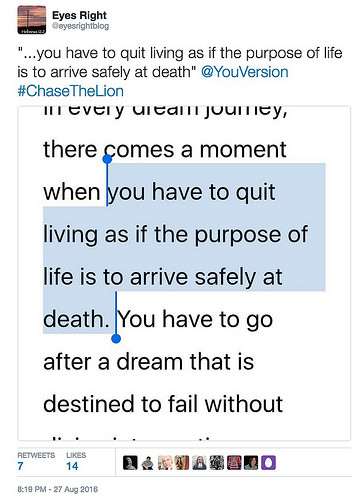Hashtags
By digitally sharing our ideas and media creations with hashtags, we can increase the “discoverability” of our messages and allow others to view an aggregated collection of related posts. According to the English WikiPedia:
A hashtag is a type of label or metadata tag used on social network and microblogging services which makes it easier for users to find messages with a specific theme or content. (1)
The collection of tweets below was curated and saved in 2016. Different Twitter users shared these Bible verses, links, and ideas using the hashtags #Jesus or #Bible, which enables others to more easily find and connect to them.

https://twitter.com/DrJasonNewsome/status/784823907807334400

https://twitter.com/SeannDonnn/status/784825953574879233

https://twitter.com/PoetWorship/status/784824131992821760

https://twitter.com/ForgettheSea/status/780067701410635776

https://twitter.com/Ellepz/status/784848184992411648
Mainstream media events have moved hashtags into our vernacular lexicon. More folks “on the street” today (in the United States, at least) have heard of hashtags and even used them. The Presidential election debates in the United States in fall 2016 and professional sporting events are cases in point. Ever growing numbers of people watching live debates on television or live sports games also use “a second screen” (a laptop, smartphone or tablet) to read what other people are thinking and sharing “live” during an event, and often to participate in these distributed, online conversations.
In July 2012, The PEW Research Center reported:
Half of all adult cell owners (52%) have used their phones recently for engagement, diversion, or interaction with other people while watching TV. (2)
While many Christians may use hashtags during live political and sporting events, many may not have connected the potentially constructive use of hashtags for sharing our faith. Whether we are praising God, sharing a verse from his holy Word, or reflecting on an article or a book, hashtags can help us connect our ideas to others. Some authors and books, like “Chase the Lion” by Mark Batterson (@MarkBatterson), use their own hashtag and encourage readers to use it as well.

“Tweet on #ChaseTheLion” (CC BY 2.0) by Wesley Fryer
As you share Bible verses, infopics, sketchnotes, or other kinds of Christian-related media messages, consider using hashtags. These hashtags can increase the visibility and discoverability of your messages. They can also help you and others search for and find your own messages later. Think of this like you are adding your posts to an “index” chapter of a book.
As the author has been developing and sharing the ideas for this “Digital Witness for Jesus Christ” project, he has shared Bible verses, images, videos, and other media links on Twitter using the hashtag #dw4jc. There are risks in using a hashtag: No single individual or organization can control all uses of a hashtag so Internet trolls (people “who sow discord on the Internet by starting arguments or upsetting people, by posting inflammatory, extraneous, or off-topic messages in an online community”) are always a risk. (3) The positive potential for hashtags to positively amplify and aggregate our content, however, can often outweigh the risks.
Use hashtags to not only connect your ideas to others, but also connect with other people who are sharing thoughts, links, verses and media about Biblical and faith topics of interest. Please use the Twitter hashtag #dw4jc as you use and apply the ideas shared in this project with others! This will help us find and connect with each other, so we can encourage and amplify Jesus together!
Chapter End Notes
(1) Hashtag. (n.d.). Retrieved October 08, 2016, from https://en.wikipedia.org/wiki/Hashtag
(2) Smith, A. (2012). The Rise of the “Connected Viewer” Retrieved October 08, 2016, from http://www.pewinternet.org/2012/07/17/the-rise-of-the-connected-viewer/
(3) Internet troll. (n.d.). Retrieved October 08, 2016, from https://en.wikipedia.org/wiki/Internet_troll

Recent Comments in this Document